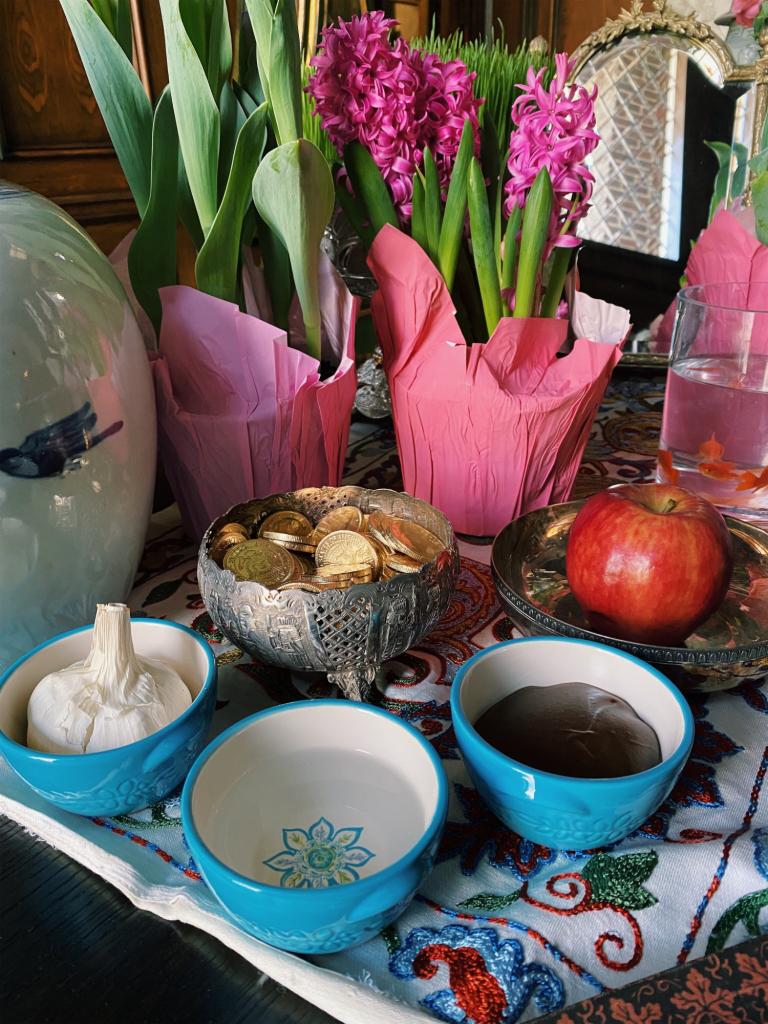This article was originally published last year, but its message is still an important one. This year, Nowruz begins today — Saturday, March 20. We wish all who celebrate a Happy Nowruz!
In our home, every year at this time, we celebrate Persian New Year or Nowruz (pronounced No-Rooz). It is celebrated on the day of the vernal equinox, which this year falls on Thursday, March 19. Normally this would mean a house full of relatives and friends coming over to celebrate and start the year off together, but today marks a very different occasion. Due to the restrictions in Orange County, and trying to stay safe and healthy, we decided as a family that it’s best we don’t meet in person. However, this gave us an opportunity to make our New Year even more special by staying connected virtually, and inviting other people to join in.
So, I thought I would extend the offer to all of my beautiful friends, fans, and community to come celebrate with me!

Nowruz Brings People Together
Nowruz is a traditional Persian holiday, and probably the biggest Persian holiday at that. But it isn’t a religious one — it’s a cultural one. And it’s celebrated by millions of people all over the world — mostly Persians, although others have embraced it as well.
. . . .
What are the Nowruz Traditions?
Nowruz always starts before the equinox when it’s traditional to prepare for the holiday by doing a thorough spring cleaning. Not just because you’re expecting family and friends over, oh no. This is a full-on PURGE. You’re starting the new year off right, free of clutter, free of dust bunnies…you’re going to deep clean every inch of your space. Donate all your old, unused items to charity, organize all those loose papers, finally tackle all those home improvement projects. And this is the time for it while we are all basically quarantined, no?
Another beloved tradition of Nowruz is the haft-seen table. This is normally the entry table or mantle in your home, a centerpiece or place of honor. (Think of where we place our Christmas trees, like a focal point.) And haft-seen literally means “seven S’s.” So on the table, seven items will be placed that all start with an “S” in Farsi and each represents something that we hope for in the new year.
Traditional Nowruz Table Items:


-
Sabzeh — some kind of sprout or grass that represents rebirth and renewal (many people start growing their own from seeds weeks in advance, but I buy it already sprouted at the local Persian market)
-
Senjed — dried fruit from a lotus tree by tradition, although that’s hard to find in our area so any sweet, dried fruit to symbolize love
-
Sib — apples for beauty and health
-
Seer — garlic bulb for medical wellness and taking care of oneself
-
Samanu — this is a Persian wheat pudding and represents wealth and fertility
-
Serkeh — vinegar which symbolizes the patience and wisdom of aging
-
Sumac — a red flower or berry that grows in Iran and represents the sunrise of the new day
Making Haft-seen Tables Your Own
Families customize their haft-seen table with many other things to make them uniquely their own. Popular additions are the Quran or books of poetry, goldfish (which are used to represent life), a mirror to represent self reflection, golden coins for prosperity, and decorative painted or dyed eggs to symbolize fertility.

Almost all haft-seen tables are decorated with spring flowers, especially hyacinth. The table remains set for the 13 days of Nowruz, and personally, I think it’s one of the best parts of the holiday. On the thirteenth day, it’s tradition to take the sabzeh from the table and release it into moving water. The ritual allows us to release any old feelings, regrets or grudges we may have from the previous year and embrace what the new year holds.
My Favorite Traditions of Nowruz
The best thing about the Nowruz holiday is gathering together with friends and loved ones. It’s tradition to visit friends and family, starting with the oldest by age and working your way down. Those younger are actually accustomed to pay the older a visit. If you’ve had any disagreements with anyone or anything left unsaid, tradition is that you must resolve them before the Nowruz is over and move forward into the new year with no animosities. If you’ve lost touch with someone, write them a letter. If you’ve wronged someone, apologize.


Why Nowruz Is So Important Right Now
As we are all dealing with this global crisis right now and facing an uncertain future, I think these traditions could not be more timely. We are all stuck at home, why not do a deep spring cleaning and a purge of all our unwanted things? We are all being reminded that life is fragile and tomorrow is not promised, why not reach out to those we have unresolved issues with and heal those hurts? We can’t visit each other right now, but we can make that overdue call. We can write that email or letter. We can say the things we don’t want to leave unsaid. And when the frenzy in our world finally calms down and this pandemic has ended, let us all move into the new year with hearts that are less heavy, burdens lifted and hurts healed and prepared to embrace what the coming year has in store for us. We can all use the reset button right now.


Does your family celebrate Nowruz? What are your favorite parts of the tradition? Let us know in the comments below!
Want To Learn More About Different Cultural Traditions? Then You’ll Love:
Happy Lunar New Year! Here Are The Traditions Behind This Special Occasion
We’ve All Heard Of The Day Of The Dead, But What Is It Really?

